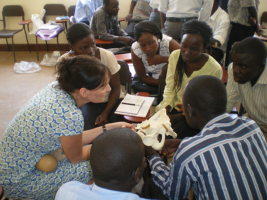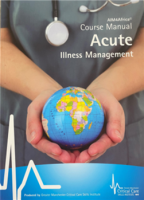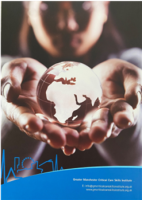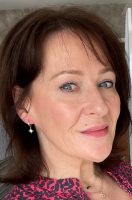Rose is Head of Global Workforce, Education and Research in the new NHS England Global Health Partnerships Directorate. She is an experienced midwife with 33 years clinical experience and nearly two decades of experience working in Higher Education Institutions as a researcher, lecturer, and manager.
She started nursing in 1985, midwifery in 1990 and in 2010 she was invited to join a colleague teaching medical students in Gulu, Northern Uganda, a post conflict zone following 20 years of civil war. Rose agreed to go because she wanted to support her colleague but at that time did not have a strong personal desire to engage in global health work.
“I think I was what’s probably known as a reluctant volunteer. I wanted the experience but wasn’t hugely driven to explore or understand global health. But I just happened to be in a senior enough position in my clinical career to be asked … to go and support a new university and a new medical school. They wanted some obstetric and midwifery teaching for medical students and an obstetrician who I worked very closely with at the time, said, will you come along with me and I said yes”
The work formed part of a programme of work with an established health partnership called the Gulu-Man Link and as such she was well prepared by attending preparation events with colleagues and former volunteers.

They shared information, advice and tried to manage expectations – they were all extremely enthusiastic! Rose’s first trip was for two weeks based in Gulu University Medical School in the university.
Teaching was very different to teaching in the UK. The students expected to be ‘given’ knowledge and weren’t used to interactive teaching methods which was a challenge. Living and teaching conditions in Gulu at the time were also very challenging. At the end of the two weeks Rose was not convinced that that what they were doing could really have any impact.
“I wasn’t sure it was the best use of my time, or skill set, or funding etc. There was no water, no electricity, there were no resources, even in the hospital. It was a tough place, I wasn’t sure we could make a difference, or have any impact or if I would want to go again”
However, she realised the value of midwifery to maternal and child health in the country.
“Midwives are uniquely able to provide essential services to women and newborns, even in the most difficult settings. Midwives are trained to work with their eyes, ears and hands and can, without equipment, make a fundamental difference in reducing maternal and newborn deaths and disability …I knew I could pass on those skills. I knew they were important because they come with the professional and aren’t dependent on money like drugs, power, storage, equipment”
During a second round, she replaced someone who declined to go at the last minute, to provide more clinically focussed, skills based training to doctors, nurses and midwives. This trip changed everything. It confirmed the impactful processes starting to happen as part of the health partnership. She has continued to visit regularly since then and has developed lasting relationships and sustainable support systems ever since.
“That trip absolutely switched my thinking, because I saw the potential for impact and I met health professionals who told us we were making a difference. And so then I did become invested in Gulu and Uganda and have been so many times since then”

As a result of the personal and professional learning that took place during the teaching in Gulu, Rose and a team of fellow health professionals delivering an Acute Illness Management (AIM) course worked together to adapt the gold standard NHS AIM materials for use in low and middle income countries.

“We decided we needed to create some materials that were suitable for use in low middle income countries. So we were teaching a short course called AIM, how to manage acute illness to prevent further deterioration. In the NHS you call for help, so what if there is no help and you are the only worker. You need to administer oxygen at 15L per minute but what if there is no oxygen, administer drugs which if they are lucky enough to have need to be kept cool, but there is no fridge or if there is a fridge there is no electricity and so on and so forth… So we decided we would write materials that went through a hierarchy of response so that gold standard was taught but pragmatic alternatives were also offered. We delivered a 2 day programme and train the trainer for some of the candidates…so it was building in that capacity building”
However, the learning was not really one way. Rose learned as much as she taught. She was able to see how things are done differently. She developed better communication skills, had more awareness about the impact of culture and identified her own need to learn more about the world and people and cultures within it. She learned she was tougher and more resilient than she had thought. She learned how to lead and how to be and grow outside her comfort zone.
On reflection, multiple global experiences have transformed Rose’s thinking, and she has reflected on the lasting contribution of her trips to individuals, teams of staff and health systems in Uganda but more importantly the change in her own thinking and being.
“I am a globalist now. So the first trip I thought it was about going to teach a specific group of medical students. By the time 3rd, 4th, 5th trip I knew I was supporting a system not just individuals. I knew that I was part of a much bigger programme and vision. I know that I am a better health care professional and person because of my global engagement”
Rose describes a growing awareness of various cultural and gendered dynamics and staff hierarchies in Uganda (and the impact of colonialism on Africa) during and after her global experience and was supported by her colleague. She recommends people interested in global experiences to familiarise with the country beforehand.
Clear partner ‘asks’ and reciprocity in her view are crucial to global experiences which should in her opinion be long enough to support integration of staff into the local community and health system. She has kept in contact with many colleagues over the years since her first global experience.
‘We didn’t go in and say we’d like to teach you this. They said we need you to teach us this. We don’t have skills in this area. Can you help us? I don’t think it’s good to drop people in and then pull them back out. I think it’s a bit pointless, generally it doesn’t help build resource. We have a program called SCALE which is about partnership building and focused Health System Strengthening, movement of people doesn’t take place until relationships are formed over a period of at least 6 months but preferably a year virtually. So you already have the relationships and you’ve demonstrated your commitment I think this is the way forward.
I would be more circumspect about who and for how long. More emphasis on adding value to the recipient country, ensuring we don’t undermine the decolonialisation agenda, awareness of climate change. I would propose that relationships are built up virtually over a 6-12 month time”
In her role, she has conducted multiple trips across the globe and reflects on the impact of global experiences on her career pathway over time.

“A completely different path, I thought my focus would be on Women’s Health and midwifery forever, but it was through the global work I became interested in not only global health and inequalities in health but things like behaviour changed research, what different ways of doing things, which ultimately led to doing my PhD. And then that led to my links with the global team and doing work with them as an academic and ultimately applying for a job in GHP. So yeah, I think it’s made a massive, massive difference to my career path.”